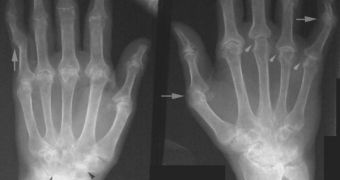Rheumatoid arthritis is a disease caused by one's own immune system, in that the defense mechanisms inside the blood streams begin attacking each other, thus causing severe diseases, including this one. This happens because our systems are equipped to identify foreign bodies in our organisms and tackle them when they are "in range." This accounts for the response we give to pathogens, such as viruses, fungus and bacteria.
But when the immune cells see themselves as perpetrators, then they begin attacking themselves. Usually, cells that have mutated to this point are destroyed in their early stage, before they become functional. The process is regulated by a molecule known as Foxp3. When this molecule is absent, or when the genes regulating its production mutate, there is no immune "checkpoint" to ensure that they are destroyed.
By elaborating a Foxp3-inducing medicine, scientists at the Medical Research Council's (MRC) Laboratory of Molecular Biology, in Cambridge, are confident that they made a breakthrough in treating rheumatoid arthritis. "We have generated a modified form of Foxp3 which can be introduced into immune cells using genetic engineering techniques and then activated by a simple injection. When administered to and activated in animal models of arthritis, the modified cells inhibit or even reverse the disease process," explains team leader, Dr. Alexander Betz.
"First, we will develop a human Foxp3 factor and then assess its function in human arthritis models. To be viable as a therapeutic option, the regulatory cells must fulfill certain criteria; they must be tissue matched to the patient for compatibility; they must only block the targeted disease and not the whole body immune response; and they have to home correctly to their target tissue. Establishing these criteria will be the key focus of our research," added Betz.
If the researchers are successful in creating a viable substance, fit for humans, then, most likely, the future of rheumatoid arthritis treatments is bright. The disorder could be treated with a simple vaccine that could be added to the list of those used on children, during infancy. Such a therapy would drastically improve the quality of life for people suffering from this progressively-degenerative disease.

 14 DAY TRIAL //
14 DAY TRIAL //